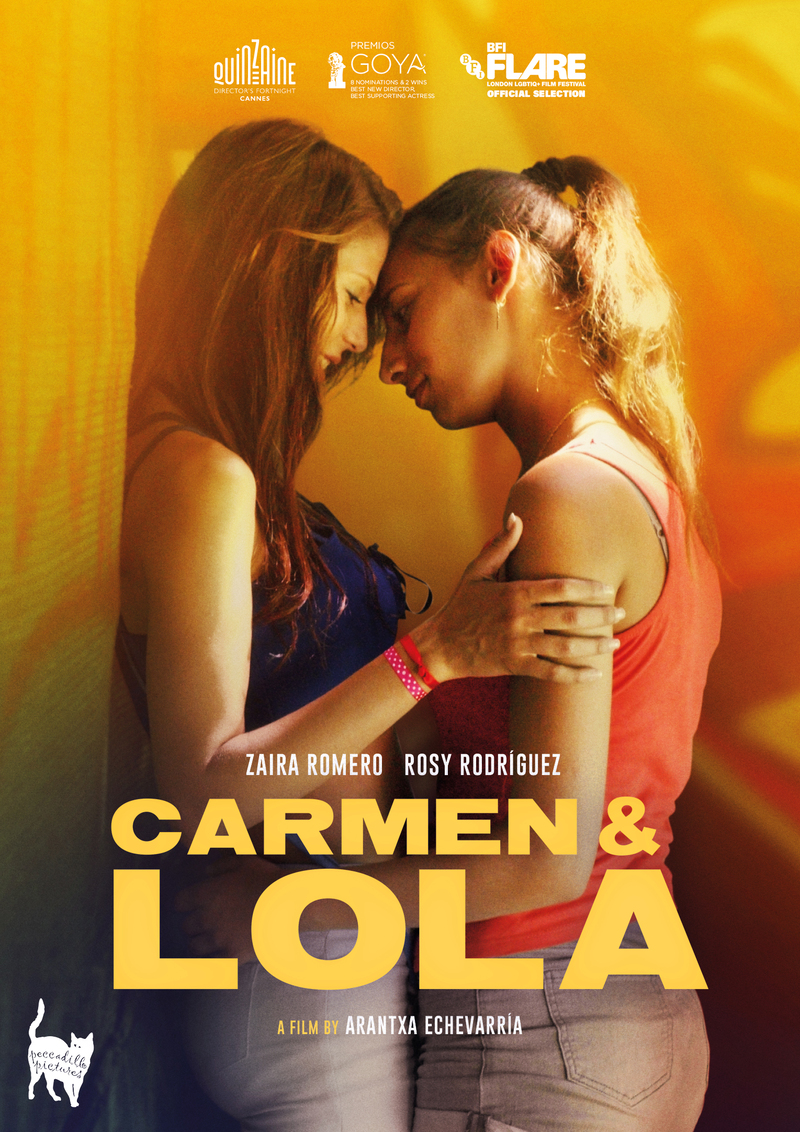
Review by
Benjamin Poole
Directed by: Arantxa Echeverria
Starring: Rosy Rodriguez, Zaira Romero, Moreno Borja, Rafaela León, Carolina
Yuste

The gay experience within Roma and Traveller communities is difficult to
quantify, probably due to the lack of empirical research permitted by this
hermetic, and at times ephemeral, culture (seriously so: in the absence of
published documentation while researching this review I ended up reading
some kid’s - excellent - Brighton University dissertation on the topic!
Thank you Lucie Fremlova!). However, most sources (including
travellermovement.org.uk) concur that LGBTQ+ existence within the Roma and Traveller society is
often characterised by shame and ostracisation via the deeply conservative
wider community.
In Arantxa Echevarría’s Carmen & Lola the
narrative centres on the blossoming love between two young Roma women in
modern Madrid; their love is deliciously forbidden, but the illicit
excitement which that beguiling adjective conjures is also tempered by
self-loathing and the very real fear of losing status in the community.
After all, the Roma and Traveller community are on the back foot as it is
- in February 2020 the United Nations special rapporteur on extreme
poverty and human rights revealed that of the 750,000 Gypsies who live in
Spain, almost half live below the poverty line. The report also firmly
denounced how España treats the community. For the girls in
Carmen & Lola, their sub-culture is paramount, as their ethnicity precludes them from
mainstream alliance and integration (a point underlined by the film’s - no
spoilers - final, bittersweet frames); unfairly, for ones so young, their
love is an all or nothing gambit.

Mind you, the alternative isn’t all that unfettered: within the community,
weddings are arranged by patriarchs who aim to have their female offspring
married alive ASAP. We open upon the striking sight of Carmen (Rosy Rodríguez) all trussed up in her wedding dress, which she has tried on for size in
the build-up to her wedding to some bloke which her father has picked out.
At this point, Carmen doesn’t realise that she is in the gays, and it
takes a chance encounter with the soulful Lola (Zaira Romero) to
ignite who she is. Lola is herself unsure of her sexuality, and
clandestinely googles ‘Lesbian Madrid’ in an internet café away from the
prying eyes of her family, who don’t even want their daughter to receive a
decent education: ‘She can read and write, what more do you want?’.
Life is mapped out for Lola and Carmen, who will end up working on the
same market stalls which bring in their family’s paltry earnings. It is
within this mercado that the two meet, routinely skiving off to share a
cigarette (leading to the breathtakingly delicate moment of Lola
leaning in to take in Carmen’s scent: ‘Do I smell of tobacco?’). There is
a fun irony in the suggestion that gayness is so verboten within the
community that no one suspects what is going on: a dad boasts that his
daughter has never spoken to a boy and does not even have a mobile phone.
The entrenched homophobia of both families allows the women to hide in
plain sight.

And it is homophobia, of the most literal kind. When both families do
begin to piece together the lovelorn graffiti which aspiring artist Lola
has tagged about the suburb, and happen upon furtive love letters (even
though, as she professes, Lola’s mother cannot read, she can still
recognise a love letter), the disgust is tangible. This is not an idle
hatred; it is instead an absolute reaction of fear and dishonour from each
family. Homosexuality seems culturally engrained as the worst thing in the
world to be.
And, yes, we’ve seen this story, with its inbuilt conflict and humanity,
many times before within low budget indie cinema, but the recurrence does
not rob Carmen & Lola of its urgent implications to the
Roma/Traveller context. Some of the film’s most painful scenes depict
Carmen’s angry self-denial at her sexuality, which are difficult to watch
not only because of the poor woman’s self-loathing but also her vile
projection onto Lola. You can’t help but imagine the pain which such
cultural restrictions enact irl.

Echevarría has a background in documentary, and the implied authenticity
of that mode is resplendent in Carmen & Lola. The market scenes are shot with immersive verité, and the culture and
traditions of Roma ring true. Moreover, the depiction of young, possibly
doomed love (which, let’s face it, most young love is) has a moving
verisimilitude which transcends the given context.

Carmen & Lola is on UK DVD and
Peccadillo On Demand from June 7th, with a wide VOD release on July 5th.

